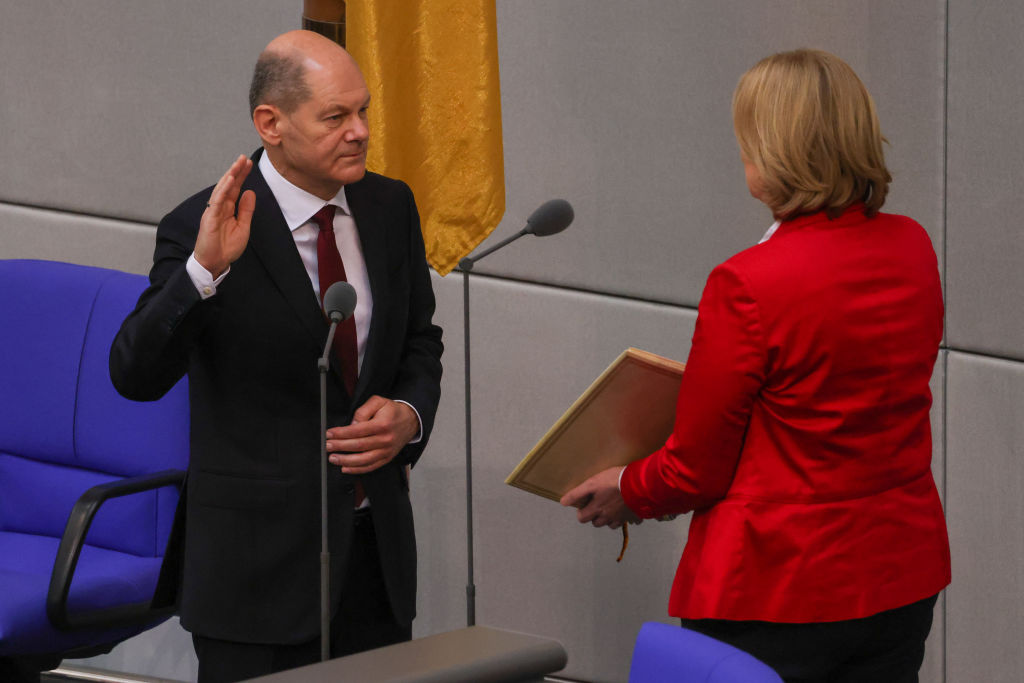
Olaf Scholz was elected chancellor by Germany’s parliament, clearing the way for the Social Democrat to take charge of tackling a brutal Covid-19 outbreak and a raft of geopolitical challenges including the standoff over Ukraine.
He will be sworn in later on Wednesday, ending Angela Merkel’s 16-year tenure and becoming the country’s ninth chancellor since World War II. The outcome in the Bundestag wasn’t in doubt because of his three-party coalition’s majority.
The 63-year-old, Merkel’s vice chancellor for the past four years, represents renewal at the top—but not too much. Voters who awarded him a narrow victory in the Sept. 26 election saw much of what they liked in Merkel—a steady hand and competent, if not charismatic, leadership.
He’ll preside over his inaugural cabinet meeting this evening, taking over after Merkel asserted Germany’s status as the paramount power broker in the European Union and one of the leading countries in the West. Scholz will have to learn how to apply Germany’s leverage amid threats on Europe’s eastern frontier and the ascendancy of China as a superpower.
He’ll also have to deal with mounting pressure from the U.S. over the Nord Stream 2 gas pipeline connecting Russia with Germany’s north coast. The U.S. will push Germany to agree to stop the almost-completed project if Russian President Vladimir Putin invades Ukraine, according to documents seen by Bloomberg and people familiar with the plans.
“Clearly Russia has the ability to blackmail Germany and Europe,” Marcel Fratzscher, president of Germany’s DIW economic research institute, said Wednesday in a Bloomberg TV interview. “My hunch at the moment is this pipeline will not take off, that it will be blocked permanently.”
Scholz has already demonstrated domestic political prowess, deftly assembling a government with two other parties with sharply diverging policies—the Greens and the pro-business Free Democrats.
The coalition, which holds 416 of the Bundestag’s 736 seats, was forged more quickly and seamlessly than most political observers in Berlin expected. During the vote on Wednesday, Scholz received 395 of the 707 votes cast.
The 177-page coalition accord bears the finger prints of each party. The SPD secured a minimum-wage increase to 12 euros ($13.50) an hour and pension guarantees; the Greens brought the country’s coal-exit date forward to 2030; and the FDP won out on a promise not to raise taxes and to preserve constitutional debt limits.
But political fights are baked in. The Greens have vowed to push Germany to the forefront of the battle against climate change, with billions in investments to expand renewable resources on the path to carbon neutrality by 2045. The FDP has assured its base that it’ll keep government spending and debt in check.
More from TIME
Read more: How Germany’s New Government Plans to Be the Greenest One Yet
Christian Lindner, the FDP chairman who will be Scholz’s finance minister, already sounded a warning on Tuesday, saying the government is observing inflation—or “monetary devaluation”—very closely and will factor it into fiscal decisions.
Robert Habeck, the incoming Green vice chancellor who oversee climate policy, said his party will stick to the ambitious pledges secured in the accord.
“There will be differences. There will be conflict. But we are fully aligned when it comes to goals,” Ricarda Lang, a deputy leader of the Greens, said in a Bloomberg TV interview.
The foremost challenge for the entire coalition will be tackling the pandemic. There has been an unprecedented surge in infections in recent weeks in Germany, which has lagged western European peers in vaccination rates.
Scholz has called for a national effort to administer 30 million shots by year-end in a bid to prevent hospitals being overwhelmed by Covid patients. He has also backed a general vaccine mandate that is expected to go to a vote in the lower house of parliament before the end of the year.
A one-time SPD activist and lawyer who became a staunch defender of the labor-market overhaul under Gerhard Schroeder, Scholz brushed past setbacks to become labor minister in Merkel’s first “grand” coalition with the SPD. Returning to his hometown Hamburg, he won a state election and governed the city from 2011 to 2018.
He’s now based in Potsdam outside Berlin, where he won a direct seat for the Bundestag this year. His wife, Britta Ernst, is the education minister for the eastern state of Brandenburg.
Scholz, whom many in Germany had written off as recently as the summer, staged a surprise comeback victory in the September vote. His direct opponents, CDU Chairman Armin Laschet and Greens’ Co-leader Annalena Baerbock, stumbled in their bid to win over voters.
The new ruling coalition, a formation never tried at the federal level, will have Germany’s first cabinet staffed half by women (excluding the chancellor himself).
Baerbock will be the first female foreign minister, while the SPD’s Christine Lambrecht will be defense minister. Nancy Faeser, an SPD leader from the western state of Hesse, will take over the interior ministry — another first.
European Central Bank President Christine Lagarde said she’s sure that Scholz and his government will “continue to work hard to advance European integration.”
“I have always admired how Angela Merkel steered Germany through many crises,” Lagarde was quoted as saying Wednesday by the Handelsblatt newspaper. “I am sure that Olaf Scholz will work just as calmly, thoroughly and in a focused way on the huge tasks that he and his government have before them.”
—With assistance from Zoe Schneeweiss, Dani Burger and Manus Cranny.
More Must-Reads from TIME
- Cybersecurity Experts Are Sounding the Alarm on DOGE
- Meet the 2025 Women of the Year
- The Harsh Truth About Disability Inclusion
- Why Do More Young Adults Have Cancer?
- Colman Domingo Leads With Radical Love
- How to Get Better at Doing Things Alone
- Michelle Zauner Stares Down the Darkness
Contact us at letters@time.com